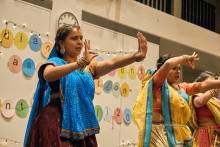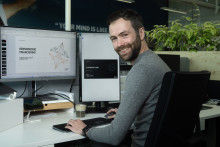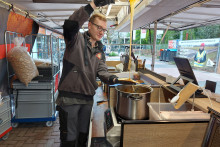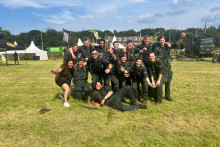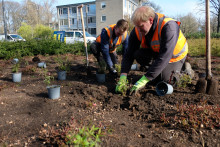Nishant Kumar, president of the ISA, kicked off the event by explaining the meaning of Diwali. This traditional Festival of Lights is a symbolic celebration of the triumph of light over darkness. ‘Diwali is not only a festival, it is about togetherness, unity and optimism,’ remarked Kumar, ‘it is about something stronger that will overcome the evil inside.’
The organizers faced some technical difficulties with the audio and the mounted stage at the beginning of the program, but the audience remained patient and cheered every time someone finished an act. Most performances were accompanied by Indian music and made use of traditional garments. Technical obstacles did not stand in the way of a lively celebration.
An inclusive celebration
Amit Desai, like many of his fellow attendants, was wearing a Kurta, a robe that is usually reserved for special occasions. He explained that even though Diwali has a Hindi origin, it is celebrated across the country regardless of religion. ‘You don’t exclude people from the celebration just because they’re from other religions.’
This attitude was evident during the event, which welcomed not only Indian students, but also guests of many other nationalities, including Olena Palii, a researcher from Ukraine. ‘This is my first Diwali event,’ said Palii, who decided to join after her Indian colleague Shukla shared her experiences of the celebration at home and at the university.
Despite the majority of performers being from India, students from other countries also made it to the stage. Muhammad Hamza Riaz from Pakistan presented a solo dance performance and a Rumanian student Denisa-Valentina Licu was part of the fashion runway. Licu wore an Indian Saree, a frequent attire for Bollywood actresses. ‘I used to see women wearing it in movies and when I got one I was very excited to participate,’ she confessed.
‘Eager to perform’
We asked Saikiran Samudrala, treasurer of the ISA, how they managed to get so many people to perform. ‘We did not do much! As soon as we started distributing flyers we were contacted by people asking if they could participate. Everybody was eager to perform.’
Samudrala said this celebration at the UT has been expanding. ‘Last year, around 100 people showed up. This year we have 200 attendants. That is why the ISA decided to contact the local restaurant Lights of India to serve food instead of getting the usual catering service from Den Haag. With 200 people, we should be self-sufficient and get all we need from Enschede.’


